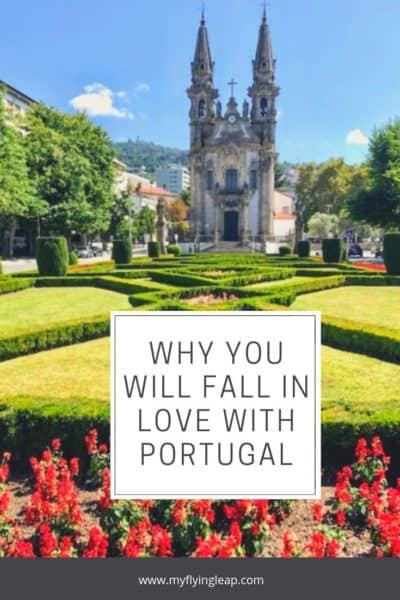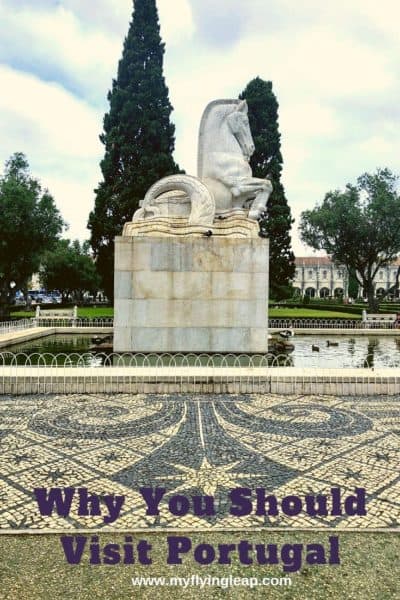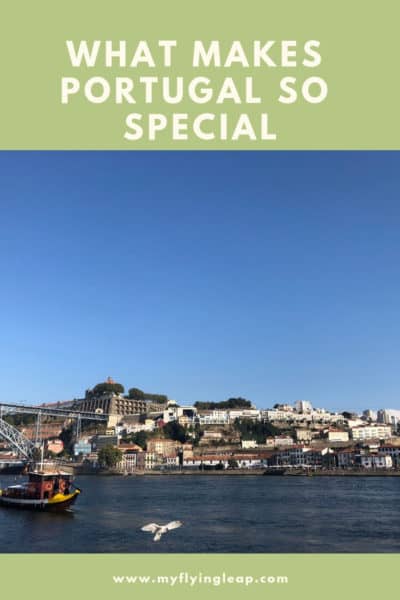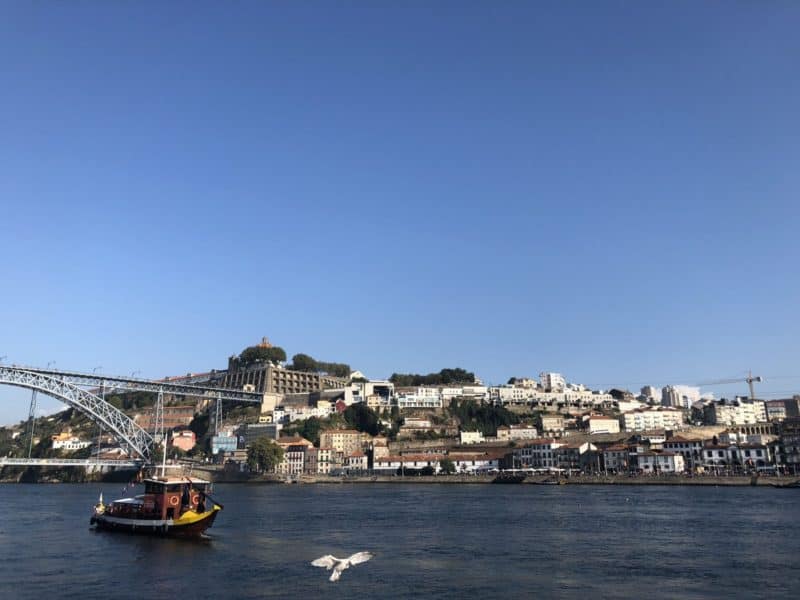What Makes Portugal so Special
I’ll admit it—I fell madly in love with Portugal. I spent 10 days there, so I only got to see a small part of the country, and yet, I’m already fantasizing about a return trip to explore more. And even the possibility of living there someday.
I’m smitten.
There are so many things that make Portugal special, and it is really hard to put my finger on exactly why I fell so hard for this amazing country. I guess that’s true about love, right?
There are so many truly wonderful things about Portugal and its people, and here are some of the best things in my book.
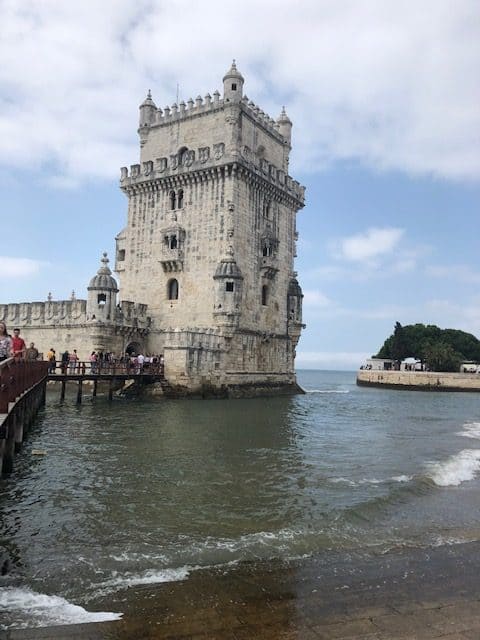
This post may contain affiliate links, which means I’ll receive a commission if you purchase through my links at no extra cost to you. Please read full disclosure for more information.
Cuisine and Wine
As a self-professed “wineaux,” of course, this is high on my list. Interestingly though, Portugal is known for port wine, a sweet, fortified wine. Sweet wines are usually not my thing, and yet I couldn’t get enough.
Was it because I was in love with the country? Perhaps.
Or maybe I just gained an appreciation for the complexity of the wines, even though they were sweet, after gaining an appreciation for the people.
But don’t you worry, as there are plenty of red wines to please the palate as well.
Port
I know very little about port wine, as this was a new experience for me. When I went to Porto, I chose to visit Porto Cálem, founded by the Portuguese in 1859. It was locally owned until recently and highly recommended by my host.
You May Also Like 11 Reasons to Fall in Love with Porto
The tour was informative and really interesting. They have a small museum where you can do a self-guided tour to learn more about how to make port wine and all that goes into the process.
The tasting was very good as well, and we got to try two different wines. They also offer Fado, a local style of music found in Portugal.
It all made for a really wonderful tour, and I’m definitely developing more of a taste for port wine!
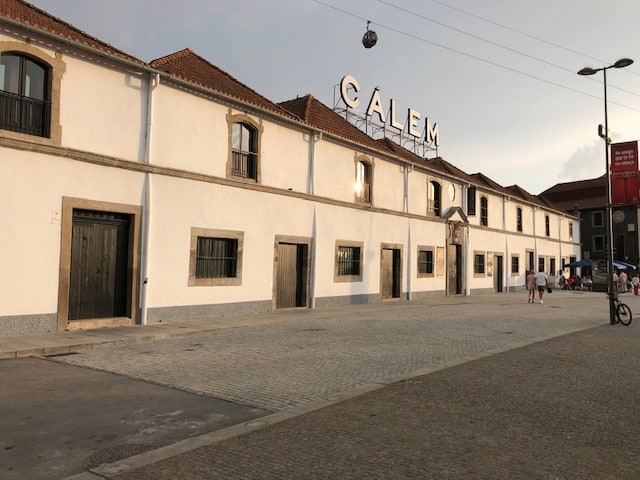
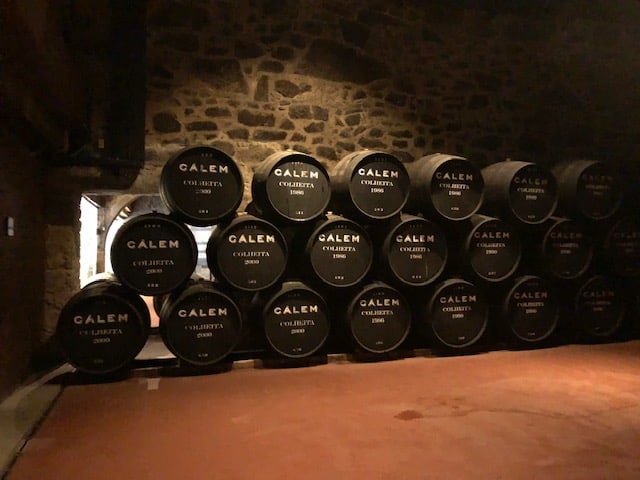
Vinho Verde
Vinho Verde, or “green wine,” is a wine from the Minho region in Portugal. It is not a varietal but is a “young wine,” with the wine being released a few months after the grapes are harvested. They may be red, white, or rosé, and they are usually consumed soon after bottling.
I had the pleasure of trying several whites and even a red while I was in Braga, which is located in the production region. The whites are light, crisp, dry, and citrusy and often have slight bubbles to them.
You May Also Like Braga: The Best Day Trip from Porto
The red had a bit of a tartness to it with slight bubbles as well. The reds are produced at a much smaller scale, and I was told they are often not available outside the region. This article has some interesting information about Vinho Verde, and I definitely recommend it, even if you’re a die-hard red drinker.
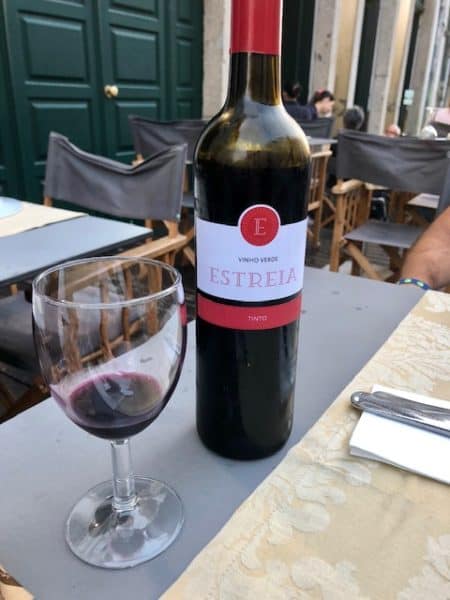
If you want to visit the beautiful Duoro Valley, where the grapes are grown, it’s a great day trip from Porto.
Food
Portugal is best known for bacalhau (salted codfish) and sardines. Seafood is plentiful since a large percentage of the country is on the water. Meat and pork are also available and plentiful. I had no expectations of Portuguese food, and I was pleasantly surprised. It was all really good!
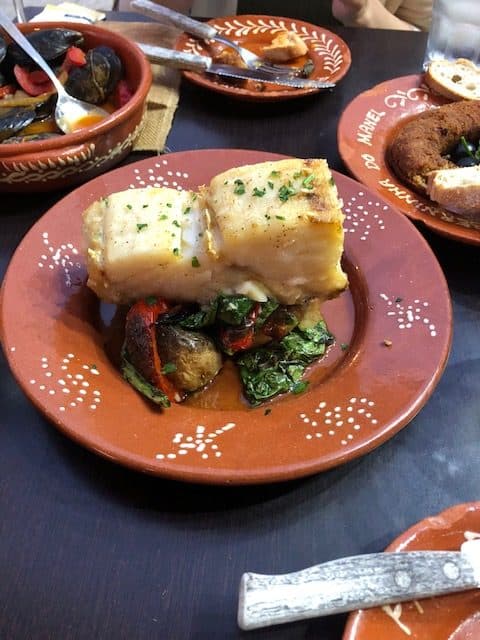
Pastries
The Portuguese people love their pastries, and in my post about Lisbon, I talked about how there is a pastry shop on most corners. In every place I went, I saw these sugary delicacies proudly displayed. I tried some that are known specialties in each of the areas I visited.
Lisbon
Pastel de nata is one of the popular pastries in Lisbon (and the Pastéis de Belém in Belém). I wasn’t overly excited by egg custards, but I sure changed my tune after trying one.
I’ll admit I was a bit addicted to this delicacy and didn’t dive much further into other options. And there are many.
You May Also Like Why You Should Visit Belém
My favorite place for them is Manteigaria, especially when they are hot out of the oven. Read about my taste test of the pastel de nata vs. the Pastéis de Belém here.
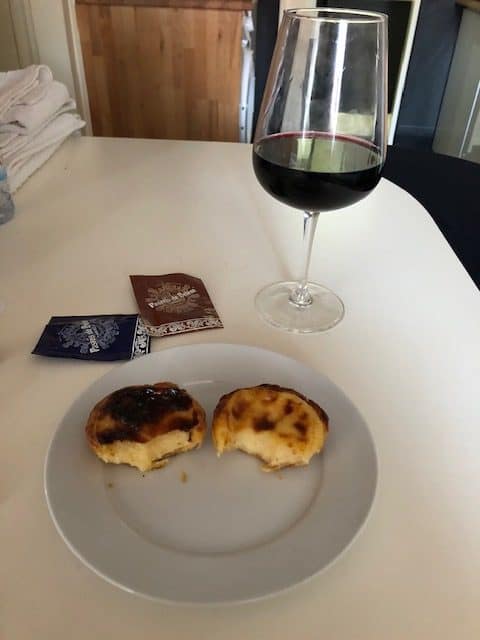
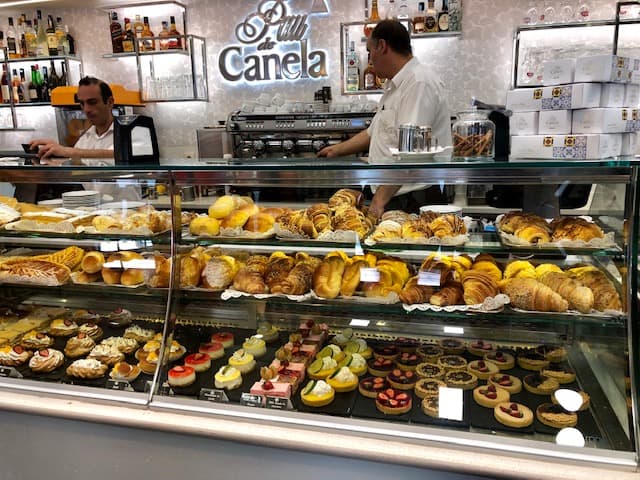
Sintra
I wrote about the pastries of Sintra, and there were some interesting and unique delicacies available. Our guide recommended Casa Piriquita for two pastries that Sintra is known for. The first was Queijada de Sintra, a not-too-sweet mini pie made of cheese, sugar, eggs, flour, and dusted with cinnamon.
The second is called Travesseiro de Sintra, or Sintra’s pillows, a long slender dough-based pastry filled with almond cream and other secret ingredients.
Casa Piriquita has been open since 1862 and is an institution for Sintra pastries, so I would highly recommend this gem and try these or others that strike your fancy.
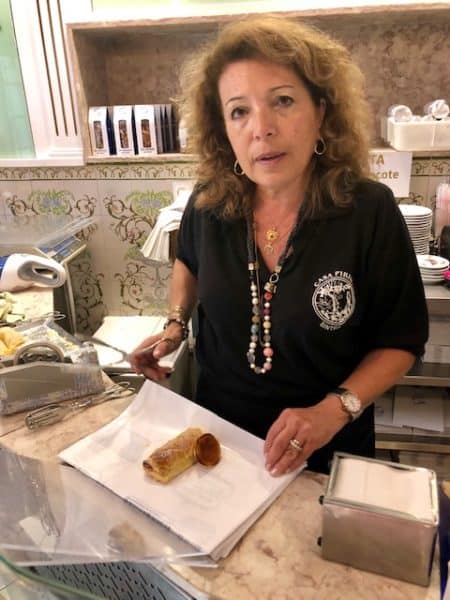
Braga
When I arrived in Braga, I had a few minutes to wait until my walking tour, so I figured I would check out a local delicacy. I went to Tibias de Braga and asked what he recommended.
He suggested a few different pasties, and I decided to get one called “Angel’s belly” in Portuguese. It’s an orange cake filled with custard.
There are other pastries the city is known for, including a savory meat pastry called the frigideira (small violin), which was very good.
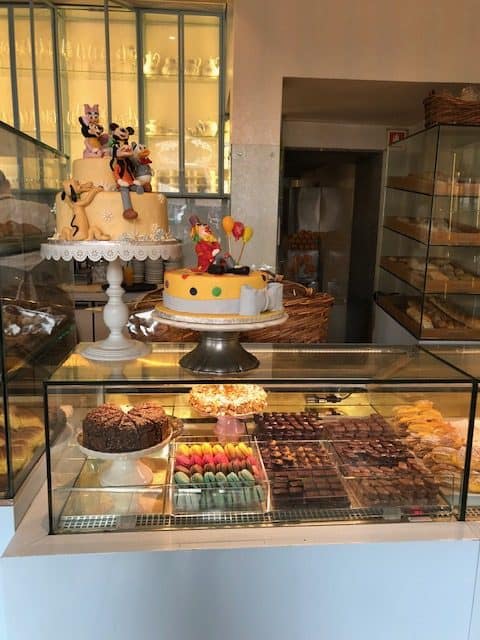
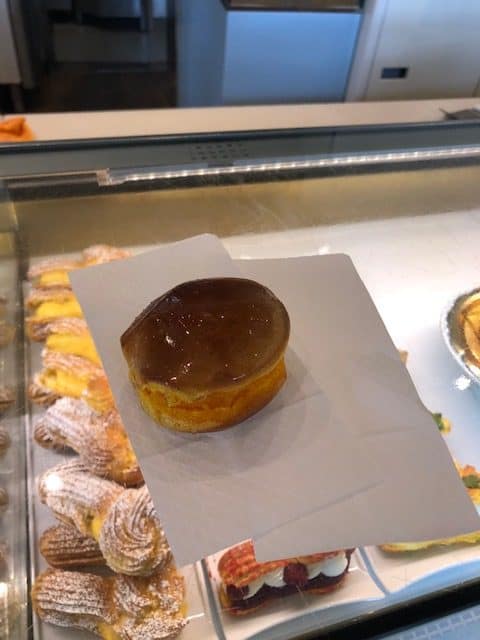
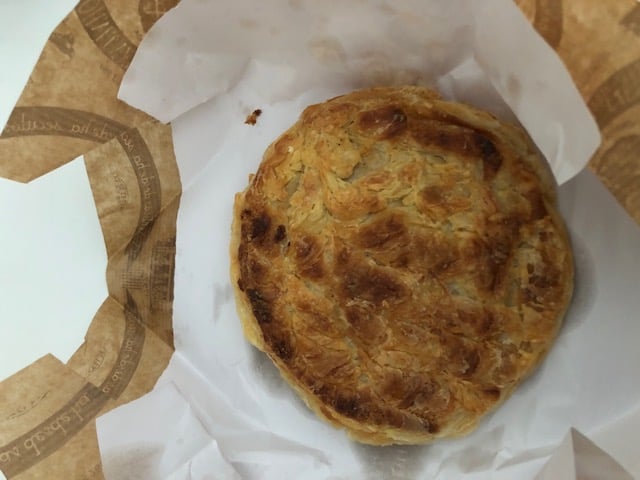
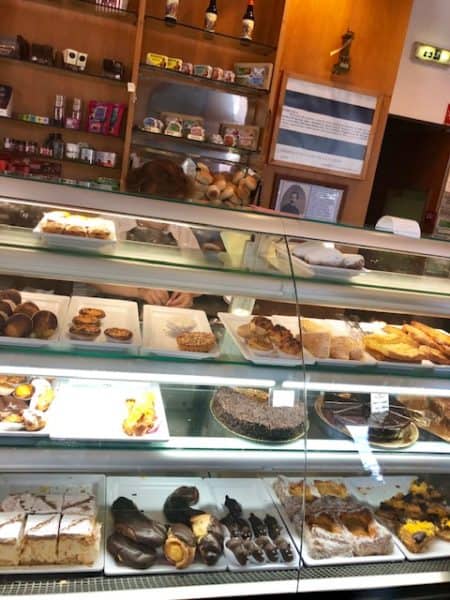
Beauty
Portugal is such a beautiful country, from the jagged oceanside cliffs to the stunning buildings. The mosaics and tile work in Portugal are different from anything I have seen throughout Europe!
There are truly so many special things about Portugal, but here are some of my favorites.
Azulelos
Azulejos are painted tin-glazed ceramic tiles found in Portugal and Spain. They are found in both the interior and exterior of churches, historic buildings, and homes. They are decorative but also help with temperature regulation.
Azulejos are all over Lisbon and Porto, and you can find them in Braga and many other cities. They feature both the traditional blue and white and some multi-colored as well.
Sometimes they depict historical scenes, and other times geometric patterns. They are stunning.
Here is a link with some interesting history. My guide in Lisbon did share that they are not made anymore in the traditional way as it was toxic, so originals are special.
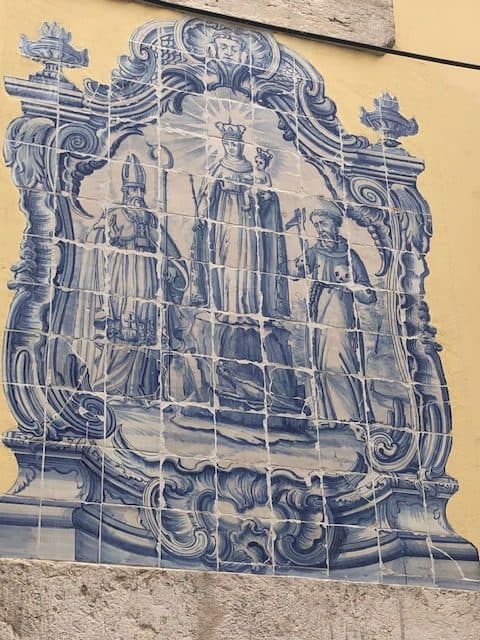
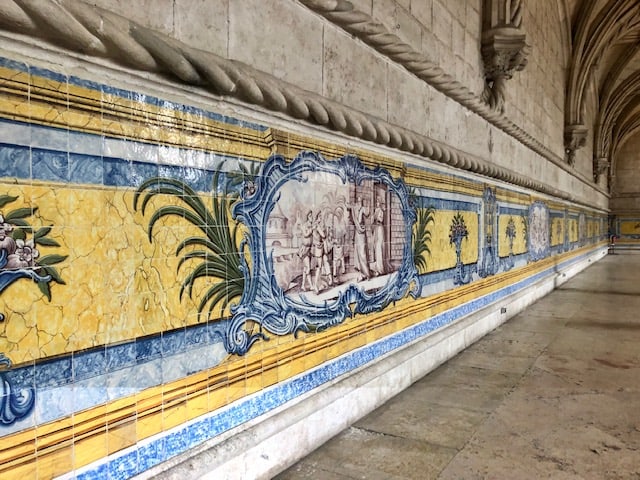
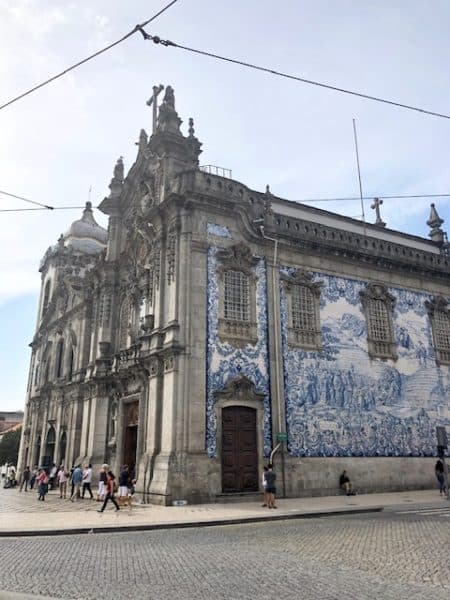
Mosaics and Tile
There are many areas of decorative tile and mosaics throughout Lisbon and Porto. My guide in Lisbon said they were laid to reduce the mud that the “high society” folks got on the hem of their clothes.
Some are clearly for decorative accents as well around famous squares, buildings, and monuments. You can also see it on many random sidewalks as well, and it makes for an interesting look.
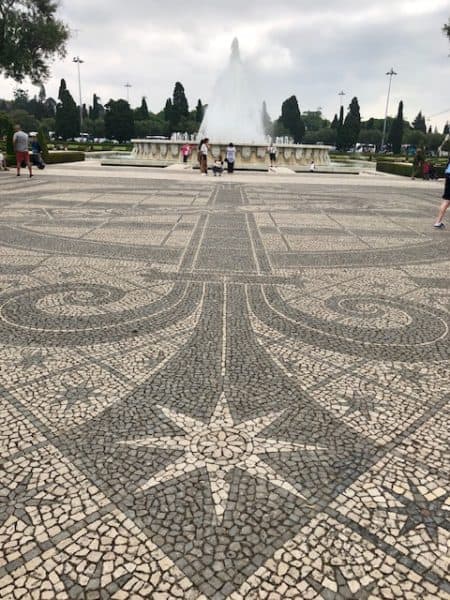

Architecture
I could spend days staring at castles, churches, and other architectural wonders. The amount of time that went into the artistry amazes me, and I could spend hours or days wandering around the walls that stood for hundreds and, sometimes, thousands of years ago, thinking of the people who built them, who stood among them, and who viewed them. Here are just a few examples from Portugal.
You May Also Like The Best Day Trip from Lisbon: Sintra
Pena Palace, Sintra
Pena Palace is high up in the mountains overlooking the city of Sintra. This stunning and almost delicate-looking palace is one of the top sights in Sintra. The gardens are quite beautiful, too. It’s a striking palace, and the views from it are spectacular as well.
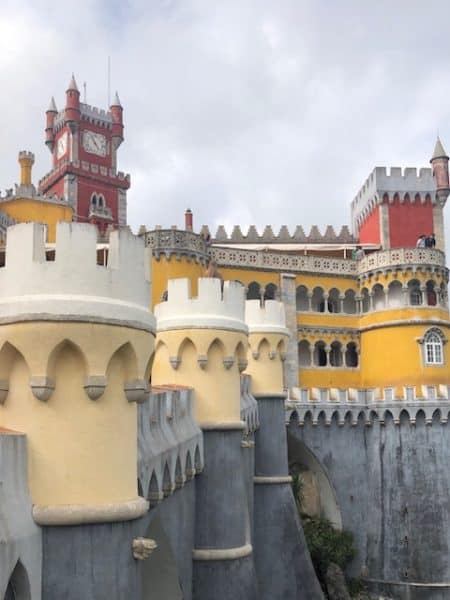
Bom Jesus do Monte, Braga
This sanctuary just outside of the city of Braga is a pilgrimage site and a truly stunning masterpiece. Not only is it beautiful, but it’s also a UNESCO World Heritage site. If you visit Porto in the northern area of Portugal, it’s worth at least a day trip to see Braga and Bom Jesus Sanctuary.
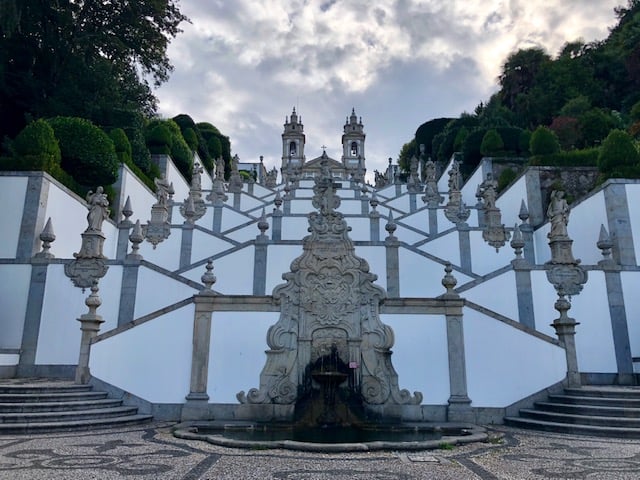
Clerigos Tower, Porto
This tower is the most emblematic structure in the city of Porto. It provides a great point in the city for navigating, as it’s easy to see from almost anywhere around. You can climb to the top of the tower for great views and explore the beautiful church at the back of it as well.
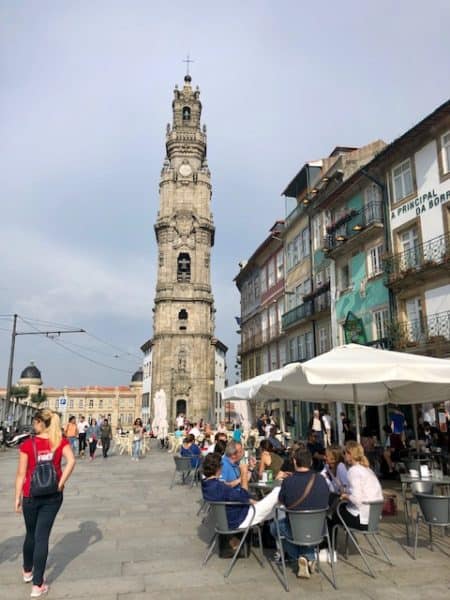
Jerónimos Monastery, Belém
When the great explorers of the Golden Age, like Magellan and da Gama, set sail from Portugal, they took off from Belém. The Tower of Belém and Jerónimos Monastery is also a UNESCO World Heritage site together, recognized for their exquisite architecture.
This building is amazing and one of the most beautiful structures I have ever seen.
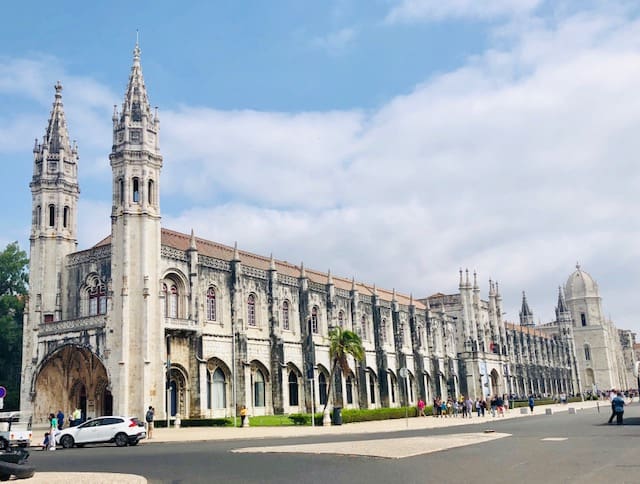
Carmo Convent and Fountain, Lisbon
Carmo Square was the site of the end of the dictatorship in Lisbon. It’s where the peaceful revolution was won by the people to overthrow decades of rule. It’s such an interesting area to visit to learn about history.
The convent burned in the fire resulting from the earthquake in 1755. However, it still stands as a memorial, and you can tour it.
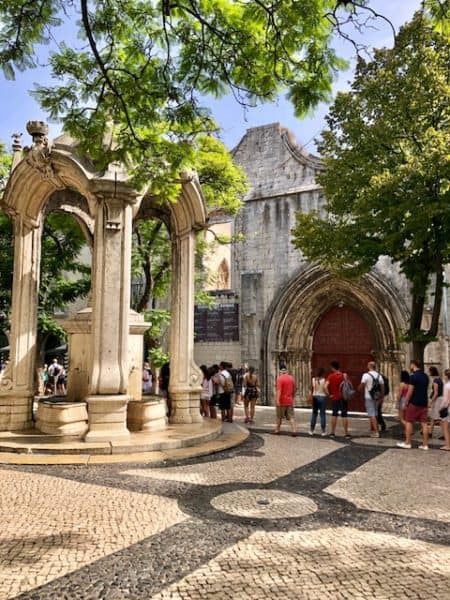
Guimarães Castle
Guimarães is also a UNESCO World Heritage site and a fantastic day trip from Porto or Braga. It’s a medieval city steeped in history with a quaint and historic town center and lots of incredible buildings, like the castle.
Though the castle is now empty, it’s still impressive and worth a tour.
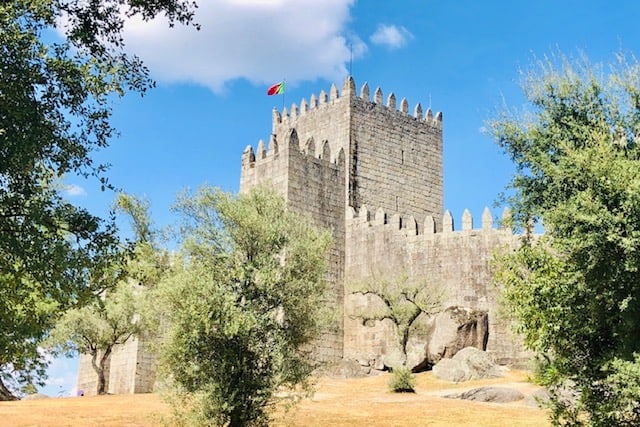
Cork
Half of the world’s supply of cork is produced in Portugal. You can find it everywhere in tourist shops, from cork keychains, magnets, and even postcards.
There are also shops dedicated to cork products. One shop in Porto had a bicycle made with cork outside the shop. It’s interesting to see the creative uses of cork, which can be quite beautiful as they are often adorned.
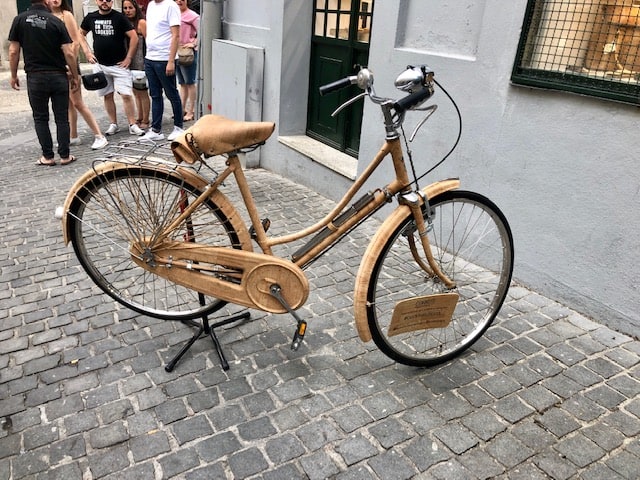
Fun and Humor
Portugal offers interesting traditions, artistic humor, and some fun off-color humor.
Bananeiro and Off-Colored Humor
Bananeiro is a seemingly random holiday of sorts celebrated in Braga on the 24th of December. It is celebrated with a glass of sweet Moscatel wine in one hand and, in the other, a banana.
Though many stories have been told about the ritual, it is believed that it was started by two collect students who went to a tavern for a pre-festivities drink of Moscatel and banana.
They returned annually, adding more friends each year. It is now such a big thing that a special place was opened in its honor called Casa das Bananas. Much of the town celebrates this holiday tradition.

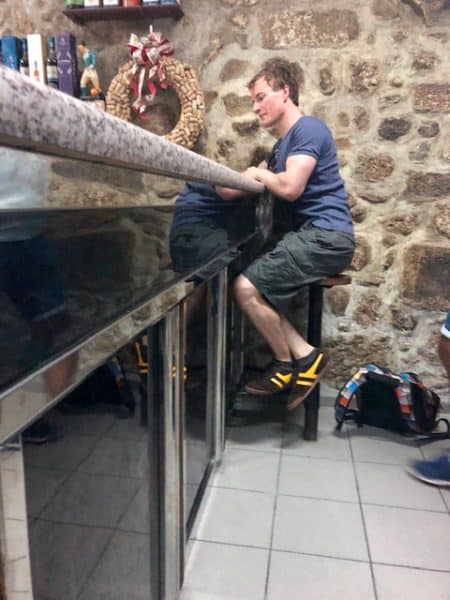
Casa das Bananas is a large bar devoid of any decor. Though, it has one very noticeable thing about it—only one chair. The one chair in Casa das Bananas has a “special” surprise when you turn to page 60 in the magazine in front of it. (Hint: be prepared to jump up if you are on the seat)!
Art
The cities of Portugal offer some interesting art and street art. A lot of it was so interesting and unique.
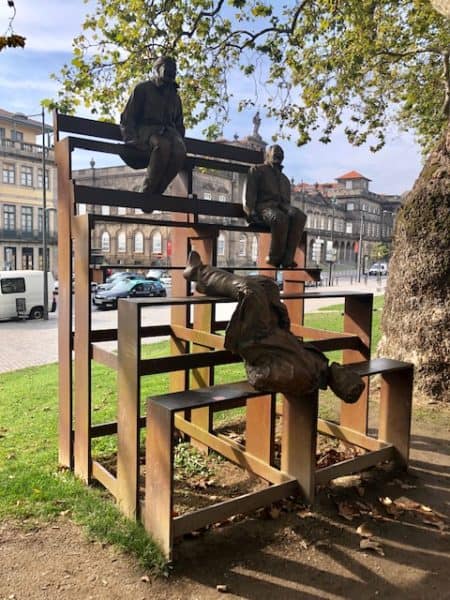
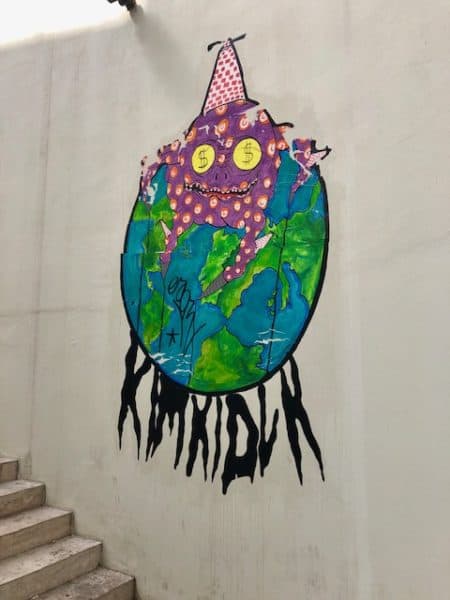
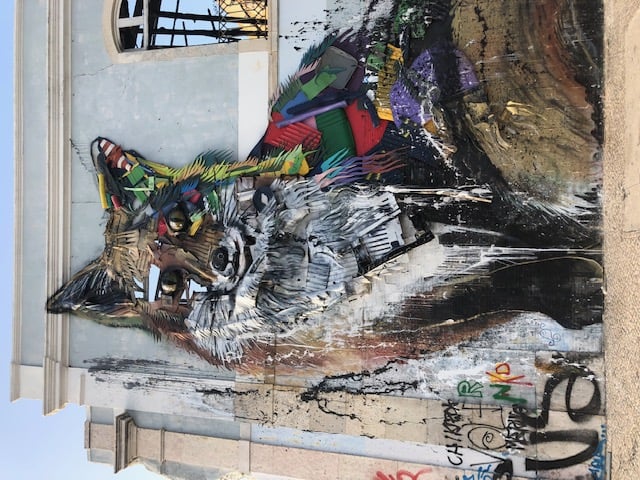
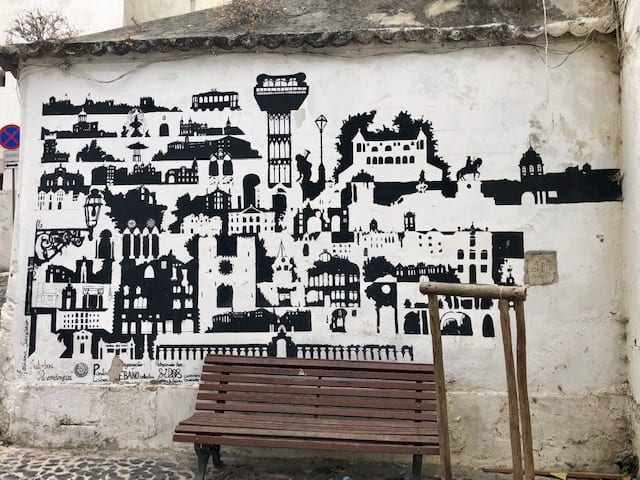
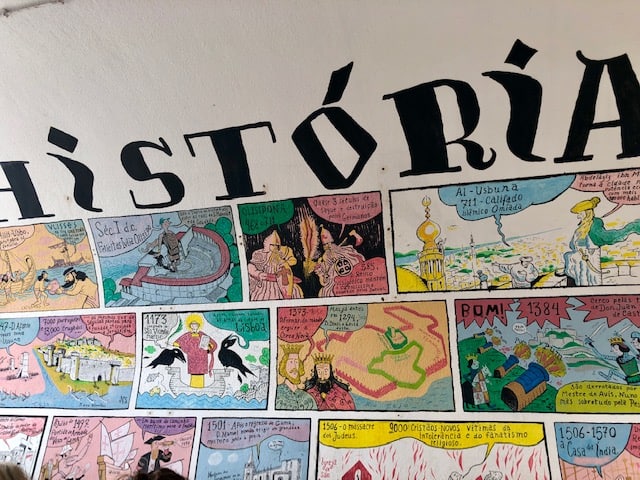
Randomness
In Lisbon, you can see random statues of Fernando Pessoa throughout the city. He was the most influential writer you’ve never heard of. Here are a couple of examples.
Read more about Pessoa, the writer you never heard of, who had a significant impact on the art here.
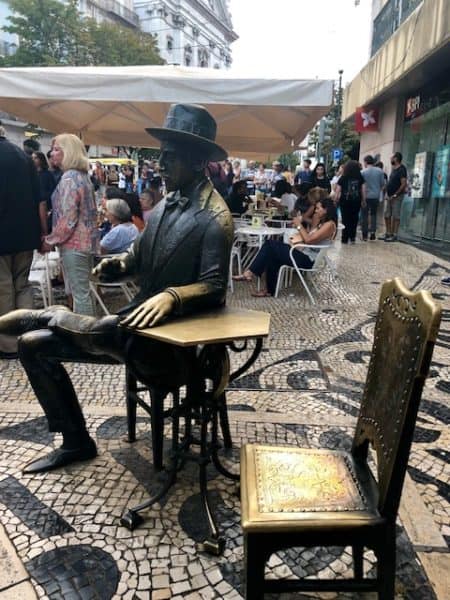
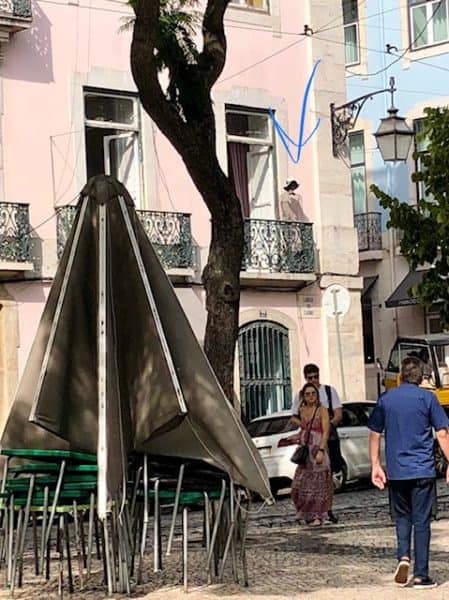
A hairdresser inside a bus station
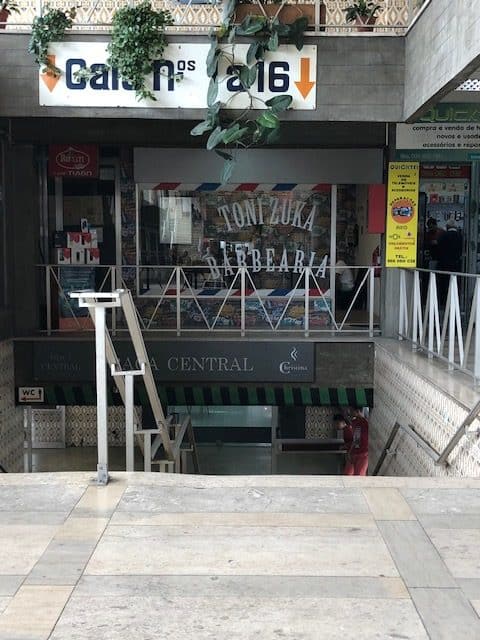
A stairway begins at the door in Lisbon.
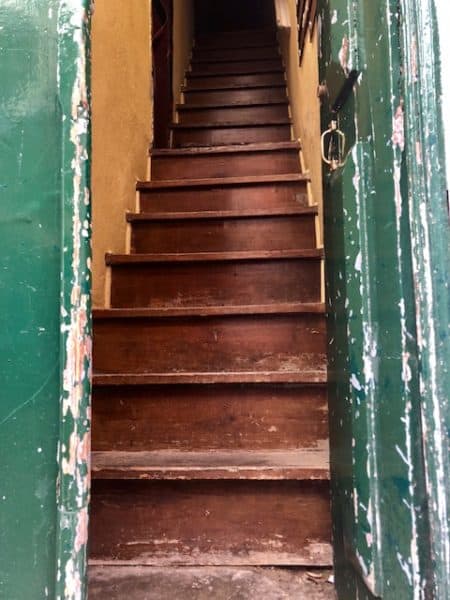
People
Portugal was once a dominant power in Europe, due mostly to their explorers who found the pathway to India, Asia, and the New World, and due to their savvy and understanding that they needed a powerful ally like England backing them.
The people have such an amazing quality to them- they have their eyes open as to who they are, their strengths, and their weaknesses, and with slightly self-deprecating humor, they shrug and move on. In general, they are friendly and welcome tourists to their country.
Even the people of Portugal love the people of Portugal.
Camilla Watson created an interesting art exhibit in the Mouraria area of Lisbon on Beco das Farinhas that showcases and honors the elderly people who lived there in 2009. They allowed her to take their picture and select which would be displayed on the wall outside their home.
It’s such a quaint and interesting display and makes you wonder about the people. There is also another with a focus on Fado performers located at Rua do Capelão.
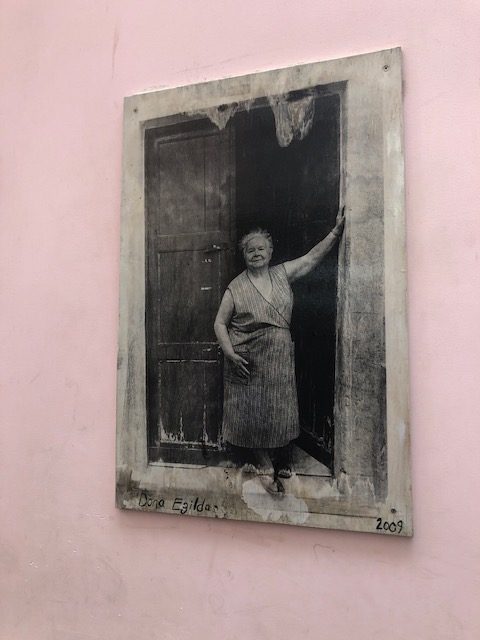
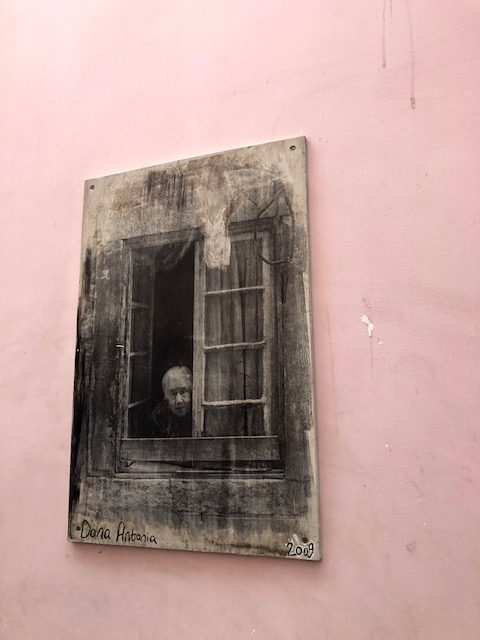
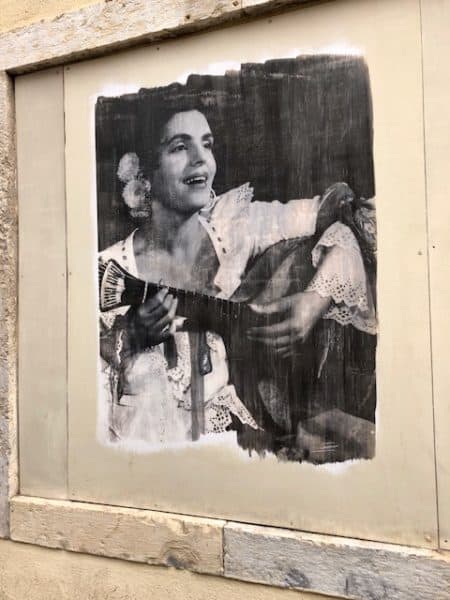
The people are also so very kind. I never really got lost, at least not for long, as someone was always offering me assistance. Even when I didn’t speak Portuguese and didn’t understand what they were saying, they showed me the way, walking me to my destination if needed.
You May Also Like Conquer a Castle by Elevator in Lisbon
The Beaches
I didn’t go to the beach when I visited Portugal. I was there in September (not prime beach season), and my mission with visiting Portugal was to determine if it might be a place I could live in someday. The beaches could wait, or so I thought.
Throughout my trip, I kept hearing about the beauty of the beaches in Portugal: my host in Lisbon had just returned from a vacation in the Algarve, my host in Porto was spending the day at the beach, and one of my walking tour buddies in Lisbon spent the day at the beach before meeting me for a port-wine tasting.
I think I may have missed out and will plan some beach time for my next visit. I have seen some spectacular pictures.
Why You Should Go to Portugal
When you layer onto all that I have listed with the culture, the history, and the vivacity of the people, you realize not only that this is a place to visit, but this could be a place you want to live someday.
So, why wait to book your visit? Go. Go now. You won’t regret it.
If you’re interested in a suggested itinerary that includes many of the best parts of Portugal, check out this 7- to 10-day itinerary.
You Might Also Like
- The Best Places to Visit in Portugal
- Porto Attractions—11 Reasons to Fall in Love
- What Makes Portugal So Special
- The Birthplace of Portugal: Guimarães
- 9 Things to Do in Sintra—The Best Day Trip from Lisbon
- Why You Should Visit Belém
- Braga City of Archbishops—The Best Day Trip from Porto
- Fun Things to Do in Lisbon—Conquer a Castle by Elevator
- Who Makes the Best Pastel de Nata? My Unpopular Opinion
- 3 Days in Lisbon—The Ultimate Itinerary
- The Best 2 Days in Porto Itinerary
Like it? Pin it!
